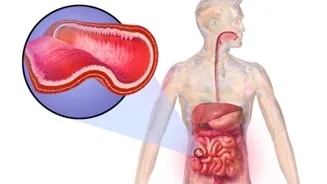What is the story about?
Crohn's disease is a form of inflammatory bowel disease (IBD), which causes persistent inflammation of the gastrointestinal (GI) tract. This inflammation can occur anywhere from the mouth to the anus, but it generally impacts the ileum, the end of the small intestine, and the colon, the beginning of the large intestine.
According to the Cleveland Clinic, Crohn's disease is a chronic (lifelong) autoimmune condition that includes unpleasant symptoms like cramping in the stomach, diarrhoea, abdominal pain, weight loss and rectal bleeding. Treatments, however, assist in controlling the symptoms so that people can lead an active life.
Here are seven ways Crohn's disease can impact your body and how to manage its symptoms:
Mouth Sores
Mouth ulcers, also known as canker sores, can occur in up to 50% of Crohn's disease patients and remain for up to four weeks, according to Healthline. Besides lip swelling or breaks in the lips or tongue, the interior of the cheeks may start to ‘cobblestone.’ The underlying condition is typically managed in conjunction with topical steroids or immunosuppressants in more severe cases.
Intestinal Strictures
Prolonged inflammation can lead to the accumulation of scar tissue, which can restrict the intestines (strictures) and possibly induce intestinal blockage. Abdominal swelling, constipation, severe cramps, nausea, and vomiting are possible symptoms. Surgery, endoscopic balloon dilatation, and anti-inflammatory medicines are among the available treatments.
Arthritis
Inflammation in the joints, or arthritis, is one of the more surprising potential consequences of Crohn's disease. Peripheral arthritis is the most common kind of arthritis among Crohn's disease patients. Usually, doctors treat Crohn's disease-related arthritis by controlling intestinal inflammation, or they could additionally recommend corticosteroids.
ALSO READ | Heart disease in women: Know symptoms and how they differ from men
Anaemia
Iron deficiency anaemia, which lowers oxygen transport to tissues, can be caused by chronic intestinal bleeding and malabsorption. This may show up as headaches, dizziness, pale complexion, and exhaustion. Iron supplements are usually administered intravenously or orally as part of treatment.
Anal Fissures
Anal fissures—small tears in the tissue lining the anal canal—are more likely to occur when there is inflammation, which can result in pain during and after bowel movements and bright red blood in the stool. Topical anaesthetics, Botox injections, or topically administered nitroglycerin therapies can be used to treat anal fissures if symptoms continue.
Fistulas
People with Crohn's disease may develop fistulas as a result of inflammation that penetrates the intestinal wall. A fistula will occur in about one out of every three Crohn's disease patients. Depending on the type of fistula, treatment options also vary, but common choices include immunosuppressive medications, antibiotics, and surgery.
ALSO READ |Surge in dengue cases in Mumbai, Lucknow, Nagpur and Kolkata: How to stay safe
Liver Disease
Crohn's disease may have an impact on the liver, which may result in hepatobiliary problems, including primary sclerosing cholangitis or non-alcoholic fatty liver disease (NAFLD). It may occasionally have an impact on liver health. A 2021 review of studies found that chronic liver disease develops in 5% of individuals with IBD.
Crohn's disease affects more than just the gut; it's a systemic disorder that can affect several organs. It is essential to consult a healthcare professional for evaluation and treatment if you are experiencing any unusual symptoms.
According to the Cleveland Clinic, Crohn's disease is a chronic (lifelong) autoimmune condition that includes unpleasant symptoms like cramping in the stomach, diarrhoea, abdominal pain, weight loss and rectal bleeding. Treatments, however, assist in controlling the symptoms so that people can lead an active life.
Here are seven ways Crohn's disease can impact your body and how to manage its symptoms:
Mouth Sores
Mouth ulcers, also known as canker sores, can occur in up to 50% of Crohn's disease patients and remain for up to four weeks, according to Healthline. Besides lip swelling or breaks in the lips or tongue, the interior of the cheeks may start to ‘cobblestone.’ The underlying condition is typically managed in conjunction with topical steroids or immunosuppressants in more severe cases.
Intestinal Strictures
Prolonged inflammation can lead to the accumulation of scar tissue, which can restrict the intestines (strictures) and possibly induce intestinal blockage. Abdominal swelling, constipation, severe cramps, nausea, and vomiting are possible symptoms. Surgery, endoscopic balloon dilatation, and anti-inflammatory medicines are among the available treatments.
Arthritis
Inflammation in the joints, or arthritis, is one of the more surprising potential consequences of Crohn's disease. Peripheral arthritis is the most common kind of arthritis among Crohn's disease patients. Usually, doctors treat Crohn's disease-related arthritis by controlling intestinal inflammation, or they could additionally recommend corticosteroids.
ALSO READ | Heart disease in women: Know symptoms and how they differ from men
Anaemia
Iron deficiency anaemia, which lowers oxygen transport to tissues, can be caused by chronic intestinal bleeding and malabsorption. This may show up as headaches, dizziness, pale complexion, and exhaustion. Iron supplements are usually administered intravenously or orally as part of treatment.
Anal Fissures
Anal fissures—small tears in the tissue lining the anal canal—are more likely to occur when there is inflammation, which can result in pain during and after bowel movements and bright red blood in the stool. Topical anaesthetics, Botox injections, or topically administered nitroglycerin therapies can be used to treat anal fissures if symptoms continue.
Fistulas
People with Crohn's disease may develop fistulas as a result of inflammation that penetrates the intestinal wall. A fistula will occur in about one out of every three Crohn's disease patients. Depending on the type of fistula, treatment options also vary, but common choices include immunosuppressive medications, antibiotics, and surgery.
ALSO READ |Surge in dengue cases in Mumbai, Lucknow, Nagpur and Kolkata: How to stay safe
Liver Disease
Crohn's disease may have an impact on the liver, which may result in hepatobiliary problems, including primary sclerosing cholangitis or non-alcoholic fatty liver disease (NAFLD). It may occasionally have an impact on liver health. A 2021 review of studies found that chronic liver disease develops in 5% of individuals with IBD.
Crohn's disease affects more than just the gut; it's a systemic disorder that can affect several organs. It is essential to consult a healthcare professional for evaluation and treatment if you are experiencing any unusual symptoms.




















